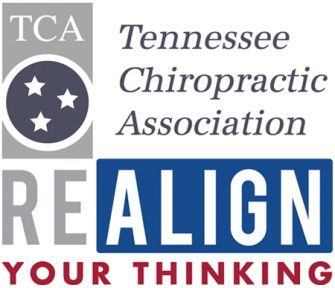World Health Organization Highlights Spinal Manipulation for Low Back Pain Over Drugs or Surgery
 The Tennessee Chiropractic Association (TCA) is pleased to share the latest in an ever-growing list of national and international health care authorities who are citing the effectiveness of spinal manipulation as an early treatment for pain before prescription painkillers. The World Health Organization (WHO) recently published recommendations to manage low back pain initially with non-pharmaceutical interventions, such as spinal manipulation, while avoiding opioids, spinal injections and surgery.
The Tennessee Chiropractic Association (TCA) is pleased to share the latest in an ever-growing list of national and international health care authorities who are citing the effectiveness of spinal manipulation as an early treatment for pain before prescription painkillers. The World Health Organization (WHO) recently published recommendations to manage low back pain initially with non-pharmaceutical interventions, such as spinal manipulation, while avoiding opioids, spinal injections and surgery.
In the Bulletin of the World Health Organization article, “Care for low back pain: can health systems deliver?” authors review six sets of updated international guidelines for managing low back pain, pointing out that all recommend avoiding medication, if possible, as a first step. They also highlight that after educating patients about low back pain and urging them to remain active, the second-step care options generally include: therapies such as spinal manipulation, most often performed by a doctor of chiropractic (DC), as well as massage and exercise. International guidelines also prioritize psychological and complementary therapies, such as mindfulness-based stress reduction, yoga, acupuncture and tai chi, over medical and surgical interventions.
“Here is just another prime example of the care we provide being effective and needed as a first-line approach to pain,” noted Dr. Brock Martin, TCA Vice-President. “It is important that those with the power to shape policy not only acknowledge this and other recommendations from leading health care organizations, but implement change to help end the opioid crisis.”
Changing the Culture

The authors point out, however, that reaching a worldwide low back pain consensus among all healthcare providers and payers will require a system-wide change involving governments, employers, consumers, professional organizations and other stakeholders. The Foundation for Chiropractic Progress (F4CP), a not-for-profit organization which has supported TCA efforts, including high-profile newspaper and billboard messaging, is dedicated to educating the public about the value of chiropractic care and recommends the following to help usher in this cultural change:
- Reduce co-pays for evidence-based, effective treatments such as chiropractic care, acupuncture and occupational therapy;
- Decrease unnecessary administrative obstacles, such as medical necessity reviews for these conservative, cost-effective treatments;
- Refine visit limits to encourage members to make such therapies part of their long-term, chronic pain management strategy, preventing the need for pharmacologic intervention;
- As authors also note, attempts to reduce opioid prescriptions should be accompanied by adequate access to substance-use disorder services, social programs and evidence-based non-pharmacological approaches to relieve psychological and physical pain.
As patients take advantage of non-pharmacological care approaches and experience better outcomes, cultural expectations and beliefs around managing low back pain will change. Continued research on the efficacy of non-pharmacological approaches to low back pain would also help advance this cultural shift.
For example, a study published in The Journal of Alternative and Complimentary Medicine concluded that adults receiving chiropractic care for low back pain were 55% less likely to fill a prescription for an opioid analgesic in comparison to adults who did not receive chiropractic care. The object of the investigation was to evaluate the association between utilization of chiropractic services and the use of prescription opioid medications. Based on the findings, the TCA reasons that pain management services provided by DCs may allow patients to use lower or less frequent doses of opioids, leading to reduced costs and risk of adverse effects.
DCs lead in safe, effective low back pain management
DCs are front-line providers for spinal health and well-being, specifically as it relates to the management of back, neck and headache pain. In addition, DCs are required to receive a minimum of seven years of higher-level education—similar to other healthcare providers. In addition, DCs are specifically trained to diagnose, evaluate and provide non-pharmaceutical care and rehabilitation to individuals suffering from acute, subacute and chronic low back and neck pain, headaches, neuro-musculoskeletal and other related conditions.
“It is exciting to be a part of this monumental shift toward evidence-based, safer care for the millions of patients worldwide suffering from low back pain,” said Sherry McAllister, DC, executive vice president of F4CP. “We urge the WHO to move forward in establishing international guidelines for the condition that advises against ineffective pharmacological and surgical care approaches and embraces drug-free pain management methods, such as spinal manipulation delivered by a doctor of chiropractic.”
About the Tennessee Chiropractic Association
The Tennessee Chiropractic Association (TCA) is a dynamic advocate for chiropractic, driven to support all Tennessee licensed chiropractic physicians and the patients they represent. The TCA works toward equal recognition and participation for chiropractic in government health care programs, in private insurance plans, and in all other arenas which impact the delivery of health care to the people of Tennessee. Visit www.TNChiro.com.
About the Foundation for Chiropractic Progress
A not-for-profit organization, the Foundation for Chiropractic Progress (F4CP) informs and educates the general public about the value of chiropractic care and its role in drug-free pain management. Visit www.f4cp.org.
